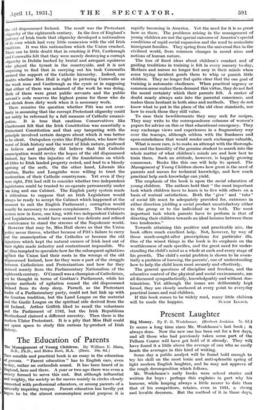The Education of Parents
The Management of Young Children. By William E. Blatz, M.B., Ph.D., and. Helen Bott, M.A. (Dent. 10s. 6d.) This sensible and practical book is an essay in the education Of parents. " Parent education " has to English ears, even today, rather an outlandish sound. It has been heard of in England, here and there. A year or two ago there was even a society formed to serve this end. But although influential and weighty, the society so far moves mainly in eircles closely connected with professional educators, or among parents of a naturally inquiring temper. Parent education has hardly yet begun to be the almost commonplace. social puzpose it is
rapidly becoming in America. Yet the need for it is as great here as there. The problems arising in the management of young children are not the special outcome of America's special conditions of rapid social expansion and the need to assimilate immigrant families. They spring from the universal flux in the civilized world, from common changes in moral aims and notions of human nature.
The loss of fixed ideas about children's conduct and of guiding traditions in training is felt in every nursery to-day.
Mothers and nurses no longer feel easy in their minds when some trying incident goads them to whip or punish little children. They no longer feel quite clear that the one goal of training is automatic obedience. When practical urgency or common sense makes them demand this virtue, they do not feel
the moral certainty which their parents felt. A canker of doubt nearly always eats into the parental conscience, and makes them hesitant in both aims and methods. They do not know what to put in the place of the old clear standards, nor how to reach those they still value.
To ease their bewilderments they may seek for recipes. They may write to the correspondence columns of women's papers for advice on this or that educational emergency. They may exchange views and experiences in a fragmentary way over the teacups, although seldom with the frankness and open-mindedness that would render such exchanges valuable.
What is more rare, is to make an attempt with the thorough- ness and the humility of the genuine student to search into the whole matter of what children's minds are and how best to train them. Such an attitude, however, is happily growing commoner. Books like this one will help its spread. The Management of Young Children shows how great is the need of parents and nurses for technical knowledge, and how much practical help such knowledge can yield.
The emphasis of the book is upon the social education of young children. The authors hold that " the most important task which children have to learn is to live with others on a basis of mutual satisfaction. Both the ` give ' and take' of social life must be adequately provided for, extremes in either direction yielding a social product unsatisfactory either to the group or to the individual or to both. The most important task which parents have to perform is that of directing their children towards an ideal balance between these two tendencies."
Towards attaining this positive and practicable aim, the book offers much excellent help. Not, however, by way of those much-sought-after prescriptions for particular ills. One of the wisest things in the book is its emphasis on the worthlessness of such specifics, and the great need for under- standing the child's mind as a whole at each and every stage of his growth. The child's social problem is shown to be essen- tially a problem of learning, the parents', one of understanding how to help. the child learn most securely and effectively.
The general questions of discipline and freedom, and the educative control of the physical and social environments, are all discussed sympathetically, knowledgeably and without doc- trinairism. Yet although the issues are deliberately kept broad, they are closely anchored at every point to everyday practical issues and real children.
If this book comes to be widely read, many little children










































 Previous page
Previous page